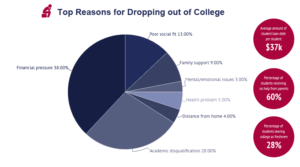Introduction – The changing landscape of education
Education has always been seen as a key steppingstone towards success and a prosperous future. However, the traditional path of pursuing a college degree is no longer the only route to achieving one’s dreams. In recent years, there has been a shift in the way young people approach education, particularly among the Gen Z generation. College dropouts are increasingly choosing alternative paths to success and are thriving in the real world. This article will explore the reasons behind this trend and shed light on the possibilities that await those who dare to break free from the mold. My daughter has decided that college isn’t right for her, so I write this article as much for her as I do those that are reading it.
The high cost of tuition and college debt
 One of the primary factors contributing to the rise of college dropouts is the exorbitant cost of tuition and the burden of college debt. The cost of attending college has skyrocketed in recent decades, making it unaffordable for many young people. As a result, students are forced to take out loans and accumulate significant debt in order to pursue higher education. This financial burden can be overwhelming and deter students from completing their degrees.
One of the primary factors contributing to the rise of college dropouts is the exorbitant cost of tuition and the burden of college debt. The cost of attending college has skyrocketed in recent decades, making it unaffordable for many young people. As a result, students are forced to take out loans and accumulate significant debt in order to pursue higher education. This financial burden can be overwhelming and deter students from completing their degrees.
The average tuition cost for college in 2023 varies by degree and type of institution. Here are some estimates based on data from the National Center for Education Statistics (NCES) for the 2021-2022 academic year:
- Public Two-Year In-State College:
- Average tuition and fees: $3,770
- Public Four-Year In-State College:
- Average tuition and fees: $10,560
- Public Four-Year Out-of-State College:
- Average tuition and fees: $27,020
- Private Nonprofit Four-Year College:
- Average tuition and fees: $38,070
These figures represent the average cost of tuition and fees only and do not include room and board, books, or other expenses. It’s important to note that these numbers are for the 2021-2022 academic year, and tuition costs for 2023 are likely to be higher due to inflation and other factors. It’s always best to consult the specific college or university for the most accurate and up-to-date information on tuition costs.
Gen Z Education Statistics
As of 2021, Gen Z (born between 1997 and 2012) is a generation that is currently in the education system, with the older members graduating from college and the younger ones still in primary and secondary education. Here are some education statistics for Gen Z:
- College Enrollment: According to the National Center for Education Statistics, in 2019, approximately 20.4 million students were expected to attend American colleges and universities, with a significant portion being Gen Z.
- Digital Learning: With the rise of digital technology, Gen Z is more accustomed to online learning. According to a study by Pearson, 59% of Gen Z students prefer a fully digital learning experience, and 67% believe that technology helps them study more efficiently.
- Student Debt: The Institute for College Access & Success reported that in 2019, 62% of college seniors who graduated from public and private nonprofit colleges had student loan debt, with an average debt of $28,950 per borrower.
- Career Expectations: A survey by BridgeWorks found that 72% of Gen Z students are willing to pursue higher education to achieve their career goals. Additionally, 75% believe that there are more opportunities for them compared to prior generations.
- Mental Health: According to the American Psychological Association, Gen Z is experiencing higher levels of stress, anxiety, and other mental health issues compared to other generations, which can impact their performance in school and college.
These statistics showcase the unique characteristics and challenges that Gen Z faces in the education system, providing valuable insights for educators, policymakers, and marketers targeting this generation.
Moreover, the reality is that even with a degree in hand, many college graduates find themselves struggling to secure well-paying jobs. This lack of job opportunities, coupled with the daunting prospect of repaying student loans, has led many Gen Z students to question the value of a college education. They are seeking alternative paths that offer a more promising future without the burden of crippling debt.
The lack of job opportunities for college graduates
In today’s competitive job market, a college degree is no longer a guarantee of employment. Many college graduates find themselves entering a saturated job market with limited job prospects. The demand for jobs far outweighs the supply, leading to fierce competition and a high rate of unemployment among recent graduates. This reality has caused many young people to question the necessity of a college degree in order to succeed in their desired career paths.
As a result, Gen Z college dropouts are turning to alternative paths that offer more practical and hands-on experience. Rather than spending years studying theoretical concepts in a classroom, they are pursuing vocational training, apprenticeships, and entrepreneurship. These alternative paths provide them with the skills and experience necessary to thrive in the real world, without the need for a traditional college degree.
The rise of college dropouts
With the increasing cost of tuition, the burden of college debt, campus life, and the lack of job opportunities for college graduates, it is no surprise that college dropouts are on the rise. This trend is not a reflection of laziness or lack of ambition, but rather a response to the changing landscape of education and the need for more practical and relevant skills in today’s job market. 
The college dropout rate in the United States in 2023 is approximately 40%. This indicates that 40% of college students do not complete their degree programs. It is important to note that the college dropout rate can vary based on factors such as institution type, enrollment status, and demographic characteristics.
Here are some key insights and statistics related to the college dropout rate in 2023:
- Overall, College Dropout Rate: The average college dropout rate for undergraduate students in the United States is 40%.
- Gender Disparities: College dropout rates are 20% higher for male students compared to female students.
- Enrollment Status: Full-time students have an average college dropout rate of 39.5%, while part-time students have a higher dropout rate of 53.8%.
- Demographic Differences:
-
- Asians have the lowest college dropout rate at 10.9%, while American Indian/Alaska Natives have the highest dropout rate at 45.1%.
- Single parents are more likely to have dropped out of college (20.7%) compared to parents in two-parent households (11.4%).
-
- Institution Type:
-
- Community colleges have a higher college dropout rate, with 58.3% of college dropouts being last enrolled in community colleges.
- Private nonprofit institutions have an average college dropout rate of 30.5%.
- Private for-profit institutions have an average college dropout rate of 30.9%.
-
- Financial Impact:
-
- College dropouts earn 56.15% less than college graduates, with median annual earnings of $39,900 compared to $91,000 for those with a bachelor’s degree or higher.
-
- Reasons for Dropout:
-
- The main reasons students drop out of college are finances (42%), family reasons or commitments (32%), and not finding the right fit in their field of study (30%).
-
- State-wise College Dropout Rates: California accounts for the largest share of college dropouts, with 15.27% at 6.6 million.
It’s important to acknowledge that the decision to drop out of college can have significant economic and social implications for individuals and families. These statistics serve as a foundation for understanding the challenges and complexities associated with college dropout rates in the United States.
However, Gen Z college dropouts are breaking free from the mold and forging their own paths to success. They are embracing non-traditional routes and finding fulfillment and prosperity in unconventional ways. Whether it be starting their own businesses, pursuing vocational training, or embarking on apprenticeships, these young people are proving that there is more than one path to success.
Why Gen Z college dropouts are thriving in the real world
Contrary to popular belief, Gen Z college dropouts and those skipping college altogether are not doomed to a life of mediocrity. In fact, many of them are thriving in the real world and achieving remarkable success. There are several reasons behind their ability to flourish outside the confines of a traditional college education.
First and foremost, college dropouts or those who only have a high school diploma often have a strong sense of purpose and drive. They have made a conscious decision to pursue their passions and are willing to put in the necessary work to make their dreams a reality. This level of determination and focus sets them apart and gives them a competitive edge in the real world.
Additionally, college dropouts have the opportunity to gain practical experience and develop relevant skills outside of the classroom. They are not bound by the rigid structure of a college curriculum and can instead focus on acquiring the skills that are in demand in today’s job market. This hands-on experience gives them a distinct advantage and makes them attractive candidates to potential employers.
Alternative paths to success – entrepreneurship, vocational training, and apprenticeships
Gen Z college dropouts are finding success through various alternative paths. One such path is entrepreneurship. By starting their own businesses, these young individuals are able to take control of their futures and create their own opportunities. They are able to pursue their passions and build something meaningful, all while bypassing the traditional route of a college degree. 
Here are some popular online business opportunities to consider:
- E-commerce: Dropshipping, print-on-demand, and selling handmade products are all viable options for college dropouts looking to start an online business. According to Statista, global e-commerce sales are projected to reach $6.38 trillion by 2024, making it a lucrative opportunity for entrepreneurs.
- Affiliate Marketing: You can promote various products and services through your content and earn a commission for each sale or lead generated. According to a survey by Rakuten Marketing, affiliate marketing spending is expected to reach $8.2 billion by 2024. Read my article on affiliate marketing.
- Online Consulting or Coaching: If you have expertise in a specific area, such as digital marketing, fitness, or career counseling, you can offer online consulting or coaching services. The online consulting market is growing rapidly, with a projected value of $343 billion by 2026, as reported by Grand View Research.
- Freelancing: College dropouts can leverage their skills in writing, graphic design, programming, or digital marketing to offer freelance services on platforms like Upwork, Freelancer, and Fiverr. The freelance market is expanding, with Upwork reporting a 24% year-over-year increase in gross services volume in Q2 2021.
- Online Content Creation: Given your expertise as an affiliate marketer, you can create and monetize online content through blogging, vlogging, podcasting, or social media. According to Oberlo, businesses are projected to spend $4.20 billion on influencer marketing by 2023, indicating the potential for content creators to earn income through brand partnerships.
Another alternative path that has gained popularity among college dropouts is vocational training. Vocational training programs or trade schools offer practical and specialized skills that are in high demand in the job market. These programs provide students with the opportunity to gain hands-on experience and develop the skills necessary for success in their chosen field.
Apprenticeships are also becoming an attractive option for Gen Z college dropouts. Through apprenticeships, young individuals can learn from experienced professionals and gain valuable on-the-job training. This hands-on approach allows them to develop practical skills and establish industry connections, setting them up for long-term success.
Overcoming societal pressure and stigma
 Choosing to drop out of college can be a difficult decision, as it often goes against societal expectations and norms. There is still a stigma attached to being a college dropout, with many people assuming that those who do not complete their degrees are destined for failure. My daughter has struggled with this since deciding to drop out of Pace University. However, Gen Z college dropouts are breaking free from these stereotypes and proving that success can be achieved through non-traditional paths.
Choosing to drop out of college can be a difficult decision, as it often goes against societal expectations and norms. There is still a stigma attached to being a college dropout, with many people assuming that those who do not complete their degrees are destined for failure. My daughter has struggled with this since deciding to drop out of Pace University. However, Gen Z college dropouts are breaking free from these stereotypes and proving that success can be achieved through non-traditional paths.
Generation Z, which includes individuals born between 1997 and 2012, is indeed facing a mental health crisis. According to a report by the American Psychological Association, Gen Z has the worst mental health of any generation. The report found that 91% of Gen Z adults experienced at least one physical or emotional symptom due to stress, and 75% of Gen Z adults reported that mass shootings are a significant source of stress for them.
Furthermore, a study published in the Journal of Abnormal Psychology found that between 2009 and 2017, major depressive episodes in adolescents and young adults increased by 52%. Additionally, the National Institute of Mental Health reports that 13% of U.S. teens aged 12 to 17 experienced at least one major depressive episode in 2023.
These statistics highlight the severity of the mental health crisis facing Gen Z.
It is important for young people to recognize that their worth and potential should not be defined solely by a college degree. Success comes in many forms, and pursuing alternative paths does not make their achievements any less valid. By overcoming societal pressure and staying true to their own aspirations, college dropouts can forge their own paths to success and redefine what it means to be educated.
The future of education – adapting to the needs of Gen Z
The rise of Gen Z college dropouts is a wake-up call for the education system. It is clear that the traditional model of higher education is no longer meeting the needs of today’s young people. In order to foster success and provide relevant skills, the education system must adapt and embrace alternative approaches.
This includes offering more affordable options for higher education, such as vocational training programs and apprenticeships. It also means incorporating practical and hands-on learning experiences into the curriculum, giving students the opportunity to develop real-world skills. By adapting to the needs of Gen Z, the education system can better prepare young people for success in the ever-changing job market.
Conclusion – Embracing non-traditional paths to success
Gen Z college dropouts are redefining education and proving that there is more than one path to success. By breaking free from the mold of traditional higher education, these young individuals are finding fulfillment and prosperity in non-traditional ways. Whether it be through entrepreneurship, vocational training, or apprenticeships, they are forging their own paths and achieving remarkable success.
My daughter’s path
If you are a Gen Z college dropout or someone considering an alternative path to success, remember that you are not alone. Embrace your unique journey and have faith in your abilities. My daughter is currently starting her own business (gaming niche) through affiliate marketing using a top-ranked platform like Wealthy Affiliate. Take control of your future and create your own opportunities. Success awaits those who dare to challenge the status quo and break free from the mold.
I’d love to hear from other kids that feel like college isn’t for them and what they think they might want to pursue or even if you still don’t know I’d like to hear from you or your parents.
regards,
Bernard
Co-Founder of Empower Marketing


Hey, your article sheds light on the shifting landscape of education, particularly focusing on Gen Z college dropouts who are redefining success through alternative paths. It’s commendable that you share a personal connection by mentioning your daughter’s decision, adding a relatable touch to the narrative.
The rising cost of tuition and college debt is a significant factor in the decision of many Gen Z individuals to explore alternative paths. Have you, or anyone you know, faced challenges related to the financial burden of pursuing higher education? How did it impact your decisions?
The article mentions the mental health crisis faced by Gen Z, with a particular focus on the stress associated with societal expectations. How do you think education systems can better support the mental well-being of students, especially those pursuing non-traditional paths?
Thanks!
Hi Job,
Thanks for your comment. Since I live in NYC the CUNY and SUNY system makes college very affordable, but my daughter chose a private university Pace. She decided after 2 months into school that she didn’t like it. Needless to say, my wife and I were understandably upset but my daughter was even more upset at herself so there was no point piling on. She’s taking a gap year to see what she wants to do but, in the meantime, I created this website for the both of us to see what other options there are for kids like her. I think society in general needs to promote other options and put them in a positive light as they do college.
That would go a long way to alleviate the stress and anxiety these kids feel. Love your kids no matter what.
Bernard